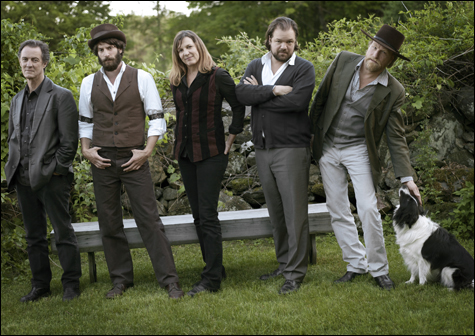
HANGIN’ WITH FRIENDS Ray LaMontagne and the Pariah Dogs. |
Ray LaMontagne's got a band now. But he doesn't have a producer. For his fourth album on RCA, he has parted ways with Ethan Johns in favor of producing his own work in a studio built in his own living room, and he has formalized his relationship with his touring band (drummer and Mainer Jay Bellerose, bassist Jennifer Condos, Patrick Warren on keys, guitarist Eric Heywood, and pedal steel player Greg Leisz) by labeling them the Pariah Dogs.
The result, in God Willin' & the Creek Don't Rise, should remind you, if you're enough of a Ray LaMontagne junky, of his early obscure work, demos that have found their way around like Acre of Land or One Lonesome Saddle. It's raw and a little ragged around the edges, but pure in a way that makes you feel like you're hanging out with Ray and his buddies just picking out songs in his living room. Which, I guess, you are.
You might want to get excited about that group effort. With consistent instruments, tone, and arrangement, the album is much more organic than his previous three major-label works. "Three More Days" and "You Are the Best Thing," though great songs in isolation, felt like tacked-on singles as early album rave-ups on Till the Sun Turns Black and Gossip in the Grain. Here, "Repo Man" is a similar classic-rocking combo of Otis Redding and Joe Cocker, but it's grittier, opening with a chunking guitar burn that's joined by a whining pedal-steel peel. And there are no backing singers. Or anywhere else on the album, either. Nor strings or horns. Other than a harmonica or a banjo that pops up here and there, this outlines the universe you'll inhabit for the next 40 minutes or so.
Something about that lets you settle into the album — the way LaMontagne has settled into his career, able to make himself completely comfortable in the process. Well, not completely comfortable. He'd rather stay out of New York City, apparently. "New York City's Killing Me" is an old-time country appeal with lots of reverb and muted drums: "Gotta get back up in the country/have couple drinks with the good old boys." And he could do without the touring, too. "For the Summer" opens just like Neil Young's "Old Man" and is a desperate plea for homecoming: "I am tired, I am tired/Can I come home for the summer?/I could slow down for a little while."
Boy is the falsetto sweet at the end of that line. As is the fat-bottomed, low-end guitar solo and the harmonica wail after the first chorus.
This could have back-fired, though. With a slightly worse performance, the tape hiss on "Are We Really Through" might sound amateurish. Instead, it succeeds like Bon Iver. You feel impossibly close to him as he worries everyone is so far away: "Is there no one who could catch me if I fall?" Similarly, when you're reminded of John Denver on "Old Before Your Time," it's in a homespun, honest way, carried by the banjo but not as raucous as "Hey Me, Hey Mama" from Gossip in the Grain. World weary, LaMontagne is maybe finding a little zen: "You win some, you lose some/You let it go/What's the use of stacking on every failure another stone?"